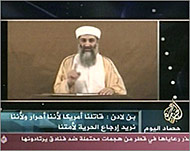Byline By MJ Akbar: The Bush Fade

The best thing about 2005 is surely the fact that it has reduced one year from the term of President George Bush. The wisdom of limits has sometimes been questioned, particularly when a sensible President like Bill Clinton comes along. But a George Bush always turns up to reinforce the merits of the law.
George Bush is not malevolent. I have this sneaking suspicion sometimes that he might even mean well. He certainly wants a theoretical democracy to prevail all over the world, for the commendable reason that with all its faults it is the most honest system of governance yet devised. He is simply a man of little understanding, which makes him a victim of the last thing he has understood. Sometimes this is in harmony with previous logic, sometimes in direct contravention, but once he is convinced about something it becomes a conviction, until the next thing he chooses to understand comes along.
His views are a slide presentation of shifting certainties. Because he is well-meaning he is totally sincere about each slide. He was as certain about the need to use torture in America’s war against terror before 10 December, as he was sure on the 11th that torture should, pace the John McCain amendment, never be a part of American policy. He does not abandon a past position; he simply forgets about it and seizes ownership of each defeat by reformulating it as victory.
He is not simple. That would be an underestimation. You cannot win two elections in America by being simple. But he is simplistic. He defers easily to those who prey upon his weaknesses with a simple ruse: they win his trust by applauding his horizon, and then map out highways that have little to do with objectives. Having led him to the centre of that inflammatory maze called Iraq, they are now charting non-existent escape routes booby-trapped with death. When a proper history of his years as the most powerful man in the world is written, it will be a long story of some success, substantial failure — but most of all a narrative of unintended consequences.
Bush was elected in 2000 to take America away from the problems of the world. Those were the innocent days during which he mispronounced "Musharraf". He was re-elected in 2004 to make America safe from the problems of the world. He will leave, in 2008, America more vulnerable to the problems of the world than it has been in a long while. On paper, he wants to change the Middle East by changing Iraq into a democracy. In practice, Iraq is heading towards what might be called a radical-democracy, where popular support has shifted decisively towards those who oppose American policy as well as American values. The one thing that Shias and Sunnis are now agreed upon in Iraq is that Americans must leave their land. Kurds support the Bush White House in the hope of achieving independence, or near independence, and that is not an option that anyone in the neighbourhood wants to hear about. Unless matters are managed with tact and intelligence, they could suffer the fate of the South Vietnamese. The radical-democracy syndrome is visible in Egypt as well, where President Hosni Mubarak opened a vent, possibly so that the West could see who would crawl out from the democratic woodwork. The only surprise when the Muslim Brotherhood got 88 seats in the legislature was why they did not get more.
George Bush and his fawn Tony Blair have now come to the end of their list of reasons for staying in Iraq. They now say that they must stay to train the Iraq Army so that it is able to fight the insurgency. In other words, they cannot pull out because of a problem that did not exist before they came. There was no insurgency before the Occupation. (The average death rate, by the way, is 30 per day; Iraqis also die, although there is reluctance to recognise this.) So we have the classic conundrum. American and British troops will not leave until the insurgency is controlled; and the insurgency will not end unless the Anglo-American armies go. Welcome to the near future.
Sometimes I wonder if policy-makers in Washington and London know what they are talking about. Every day you hear and read, from sources both civilian and military, that the Occupation forces must arm and train an Iraqi Army that can fight the insurgency after the Occupiers depart. This is the civil-war theory: after us, the deluge. This is a familiar of history: empire is always justified in terms of the good that it is doing (civilisation, trade, economic growth et al), and there is always going to be chaos after they leave, if the slaves have the temerity to ask them to leave. Winston Churchill kept harping on the chaos that would descend on India once the Haileybury and Oxbridge Sahibs left.
Let me suggest an alternative scenario. Once Bush and Blair get out of Iraq, if they do it on their watch, the insurgency will end. There will be some residual violence, because this messy war will have left deep sectarian wounds. But, sooner rather than later, the insurgency will be absorbed into Iraqi life, mostly into its politics and partly into its armed forces. We have already seen how Shia militias have become an element in Iraq’s politics and emerging power structure. Space will be created for the Sunnis as well, since common sense suggests that sectarian domination does not work. What, however, about unintended consequences? Will George Bush, over the coming two years, help create an Iraqi Army which could become the strongest Arab force in the region? Could such an Army become a formidable counterweight to Israel, particularly if it works in alliance with Iran? The days incidentally of the Iraq-Iran conflict, which brought such legitimate joy to Washington and London, are over.
Bush is doing Iraq’s Shias a favour they will never forget; has given Iran’s government a lifeline it will never acknowledge; and might have weakened Israel to an extent it will never admit.
It is remarkable that the Bush fade began so soon after the Bush pinnacle. Normally, a re-elected President has two years for a cruise towards history, free from the sinews of political compulsions. By the third year of a second term a President begins to look like the past rather than the present or the future, and starts his farewell visits around the world. In the case of George Bush, the American voter began to ask the very questions that he had ignored when sending him to the White House to continue his war. At the heart of this questionnaire was the most basic of all questions: Every war has a point, what is the point of the Iraq war?
Having admitted that all past answers were wrong, Bush is struggling to find a new answer. If all he can offer is a genie called an imagined Caliphate, then there is very little hope for sanity.
There was a poignant moment in the Bush year of 2005, widely publicised when some embedded but obviously disobedient camera captured a scrawl on a notepad. I can imagine the scene: a worthy but never-ending conference at the United Nations where protocol is in command. At some point, Bush sent a note to Condoleezza Rice wondering if there was any chance of a "bathroom break". I daresay nature doesn’t change its rules for the high and mighty. Presidents and Prime Ministers need a break as often as you and I. Bush surely wasn’t the first eminence to need one. Would Bill Clinton have sent such a note to Madeleine Albright? Somehow, I don’t think so. I rather see him as getting up, making a small but meaningful joke, and promising to return as soon as he could. Television news channels would not have interrupted their broadcasts to telecast this.
George Bush has confidence; you can see it in the arms that loop over on either side, rather than fall down straight, and there is just a hint of swagger in the stride and the eyes. But I am not too sure that he has self-confidence.
-Back to Main Blog










